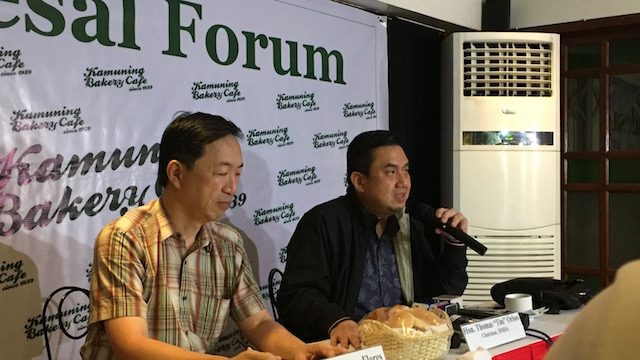SUMMARY
This is AI generated summarization, which may have errors. For context, always refer to the full article.

MANILA, Philippines – The Metropolitan Manila Development Authority (MMDA) is hoping to extend the implementation of the “no window hours” policy, citing the success of the scheme in easing metro congestion during the holiday season last year.
Under the policy, cars covered by the number coding scheme for a particular day won’t be able to use metro roads even during the 5-hour “window” period from 10 am to 3 pm.
In a luncheon forum on Monday, January 16, MMDA General Manager Tim Orbos said they initially projected traffic to worsen by 20% to 30% during the holiday season.
Despite this, Orbos said the “no window hours” policy helped in cutting congestion “by 5% or 10%.” (READ: EDSA traffic flow improves slightly – i-ACT)
“We had a study, a year to date, December 22, 2016 as against December 22, 2015. And despite the number of vehicles that were added, we were still faster, a little less than 10 minutes,” Orbos said.
The MMDA chief said he hopes the Metro Manila Council and the Inter-Agency Council on Traffic would consider extending the policy, which is supposed to be in effect only until January 31.
Asked about his earlier proposal for the return of the “odd-even” traffic scheme as a radical way to ease traffic, the MMDA chief now said he considers it too “drastic.”
“I said that seriously beginning of the year, but then I will also admit, we looked at the numbers yesterday, maybe it’s too drastic a measure for us to take at this point. I would rather maintain the no-window number coding, but we have to clean up the roads,” he said.
Orbos said the MMDA will strictly go after illegally parked vehicles so traffic could flow freely.
“I think we have enough roads in Metro Manila, if only we can use them properly,” he said.
Coordination with LGUs
During the forum, Orbos was also asked about the MMDA’s coordination with Metro Manila local government units (LGUs), which have their own set of traffic rules and regulations. Pasig City, for instance, implements an odd-even traffic scheme on certain roads.
Orbos acknowledged the particular challenges that local leaders face in their jurisdictions. But in the absence of a central authority, he said, Metro Manila mayors have to communicate and work together to help solve traffic.
“Ang hirap din kasi ng problema nila eh, imagine. Let’s take the case of Pasig. Papaano ka namang hindi gagalaw nang ganoon? Naaapektuhan ka ng Quezon City, naaapektuhan ka ng Mandaluyong. Normal, kahit ako rin naman mayor ng isang lugar, itutulak ko palabas ‘yung sasakyan eh at pipigilan ko ang papasok sa akin. Imagine ganyan ang nangyayari dito,” Orbos said.
(Their problem is also difficult. Let’s take the case of Pasig. How can you not act when you’re affected by Quezon City and Mandaluyong? That’s normal, if I were the mayor of a certain place, I would also have to push vehicles out of my city and try to stop vehicles from entering. Imagine that’s what’s happening here.)
“That’s why emergency powers would really do well for a central authority but it’s not there, so pakiusapan talaga (it’s really coordination). Ang naging maganda lang naman, nag-uusap-usap lahat (The good thing is, everyone communicates with each other),” he added. – Rappler.com
Add a comment
How does this make you feel?
There are no comments yet. Add your comment to start the conversation.